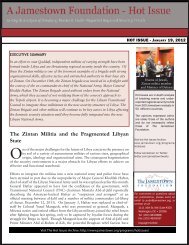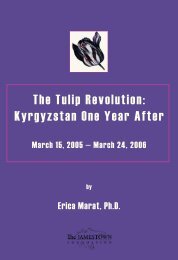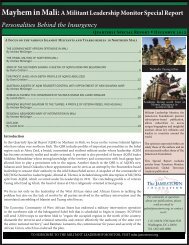By Brian Glyn Williams - The Jamestown Foundation
By Brian Glyn Williams - The Jamestown Foundation
By Brian Glyn Williams - The Jamestown Foundation
Create successful ePaper yourself
Turn your PDF publications into a flip-book with our unique Google optimized e-Paper software.
THE POLISH FRONT<br />
Prior to the Ottoman-Tatar alliance of 1475, the Crimean Khanate was on cordial terms with the Polish-<br />
Lithuanian Commonwealth. In describing this early relationship, Howorth writes Haji Girai was<br />
clearly a protege of the great Lithuanian King Vtut, and on his death in 1430, he was a faithful friend of his<br />
successors Ladislas and Casimir. He did not make peace or war without their knowledge. 80<br />
This changed with the establishment of Ottoman alliance with the Khanate. <strong>The</strong> Crimean Khans had<br />
previously relied on the Poles for assistance in their struggles on the steppe against the Golden Horde, but<br />
with Ottoman protection this was no longer necessary. In the following centuries, the Crimean Tatars<br />
acted independently in their dealings with Poland. <strong>The</strong> Crimean Tatars took advantage of this<br />
policy by making frequent incursions into Polish lands for slaves and booty whenever the Polish<br />
government was late in its tribute payments. <strong>The</strong> Khanate's Polish foreign policy was anything but<br />
consistent during this period and the Tatars often allied themselves with Poland against Russia or vice versa<br />
depending on who was offering the most tribute.<br />
This began to change with the emergence of Moscow as the main threat to Tatar dominance on the steppe in<br />
the sixteenth century. At this time the Crimean Khans began to place more importance on Poland as an ally.<br />
Muhammed Giray in particular made an unsuccessful attempt to alert the Porte of the Russian threat and<br />
form an anti-Russian alliance between the Turks and the Poles in 1521. Sultan Suleiman the<br />
Magnificent, far from listening to the Khan's advice, ordered him to attack Lithuania in order to stop the<br />
Poles from interfering in his Western campaigns.<br />
Although the Ottomans did recognize Poland's potential as a counterweight to Russian expansion in the<br />
seventeenth century, they were initially not on good terms with the Polish state. <strong>The</strong>re were two main<br />
areas of strife between the two states, namely Polish resentment over the Porte's control of Moldavia<br />
(which had been a Polish vassal prior to the great Ottoman expansion) and the raids of Polish Cossacks<br />
into Ottoman territories. <strong>The</strong> Sultan's government saw the value of the Tatars in dealing with both threats on<br />
this frontier at an early date.<br />
<strong>The</strong> first joint Ottoman-Tatar campaign against Poland took place soon after the founding of the Tatar-<br />
Ottoman alliance. In 1498, Sultan Bayezid II ordered the Crimean Tatars to assist the frontier<br />
commander, Malkoch-oghlu Bali Beg, in a raid on the eastern Polish provinces of Podolia and Galicia. This<br />
raid was in retaliation for the Polish King, Jan Olbracht's Black Sea expedition in the previous year.<br />
Described as "one of the most far-reaching plans in the history of Poland," the Polish King's plan had<br />
called for the conquest of Muslim territories from the mouth of the Danube to the Crimea itself in order to<br />
break the Ottoman-Tatar barrier which blocked Poland's access to the Black Sea. 81<br />
Although the expedition had been a costly failure, the Sultan was determined to punish the Pole's<br />
temerity with a counter raid of his own. In the spring of 1498, a Tatar force joined the forces of Bali Beg and<br />
laid waste to much of Poland's eastern areas reaching as far as Lemberg in Galicia. 82 A similar campaign<br />
launched in the following year was less successful and met with disaster in a snow storm in the<br />
Carpathian mountains. Memories of the Ottoman-Tatar retreat can still be found in Romanian folk<br />
songs. 83<br />
<strong>The</strong>se two expeditions set a precedent and clearly showed the Ottomans that the Crimean Khanate was in an<br />
ideal position to enforce Ottoman foreign policy on Poland's eastern borders in order to keep the<br />
22
















